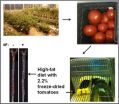Greenhouse gas policies ignoring gap in household incomes: University of Alberta study
2013-03-19
(Press-News.org) Government policies aimed at reducing greenhouse gas emissions from consumers need to be fairer for household income levels, says a University of Alberta researcher.
A U of A study published recently online in the journal Environment and Behaviour looks at the different sources of greenhouse gas emissions from consumers, based on their income levels. The wealthiest households in Alberta emit the most greenhouse gases, but too often, income disparity hasn't been factored in to current polices—such as the carbon flat tax that is levied to British Columbia residents.
Such policies tend to be based on data of CO² emitted by the average household—12.2 tonnes in Alberta according to the study, which surveyed 1,203 Albertans. Households in the province with the highest income actually emit 17.9 tonnes per year, while those with the lowest incomes generate 8.2 tonnes per year.
"Income disparity needs to be factored in when developing public policy, to avoid placing a disproportionate financial burden on people who can least afford it and who have contributed the least to the problem of greenhouse gases," said Emily Huddart-Kennedy, lead author and an assistant professor in the U of A Department of Resource Economics and Environmental Sociology.
People should continue to follow environmentally-friendly practices in their daily lives, but they can also have far-reaching environmental impact by buying smaller homes, taking public transit and most importantly, petitioning their government representatives "for environmental policies that are equitable," Huddart-Kennedy added.
Governments can consider providing incentives to build smaller homes, programs to reduce air travel and higher taxes for large or multiple vehicles, she added.
### END
ELSE PRESS RELEASES FROM THIS DATE:
Kill Bill character inspires the name of a new parasitoid wasp species
2013-03-19
Parasitoid wasps of the family Braconidae are known for their deadly reproductive habits. Most of the representatives of this group have their eggs developing in other insects and their larvae, eventually killing the respective host, or in some cases immobilizing it or causing its sterility. Three new species of the parasitoid wasp genus Cystomastacoides, recently described in the Journal of Hymenoptera Research, reflect this fatal behavior.
Two of the new species were discovered in Papua New Guinea, while the third one comes from Thailand. The Thai species, Cystomastacoides ...
Newly incarcerated have 1 percent acute hepatitis C prevalence
2013-03-19
A study published in the March issue of Hepatology, a journal of the American Association for the Study of Liver Diseases, estimates that the prevalence of acute hepatitis C virus (HCV) infection is nearly one percent among newly incarcerated inmates with a history of recent drug use. Findings suggest that systematic screening of intravenous (IV) drug users who are new to the prison system could identify more than 7,000 cases of HCV across the U.S. annually—even among asymptomatic inmates.
According to the National Institute of Allergy and Infectious Diseases Health—the ...
Pre-college talk between parents and teens likely to lessen college drinking
2013-03-19
Teen-age college students are significantly more likely to abstain from drinking or to drink only minimally when their parents talk to them before they start college, using suggestions in a parent handbook developed by Robert Turrisi, professor of biobehavioral health, Penn State.
"Over 90 percent of teens try alcohol outside the home before they graduate from high school," said Turrisi. "It is well known that fewer problems develop for every year that heavy drinking is delayed. Our research over the past decade shows that parents can play a powerful role in minimizing ...
Brain-mapping increases understanding of alcohol's effects on first-year college students
2013-03-19
A research team that includes several Penn State scientists has completed a first-of-its-kind longitudinal pilot study aimed at better understanding how the neural processes that underlie responses to alcohol-related cues change during students' first year of college.
Anecdotal evidence abounds attesting to the many negative social and physical effects of the dramatic increase in alcohol use that often comes with many students' first year of college. The behavioral changes that accompany those effects indicate underlying changes in the brain. Yet in contrast to alcohol's ...
Conscientious people are more likely to have higher GPAs
2013-03-19
Conscientious people are more likely to have higher grade point averages, according to new research from psychologists at Rice University.
The paper examines previous studies that research the link between the "Big Five" personality traits –agreeableness, conscientiousness, extraversion, neuroticism and openness to experience – and college grade point average. It finds that across studies, higher levels of conscientiousness lead to higher college grade point averages. It also shows that five common personality tests are consistent in their evaluation of the "Big Five" ...
UCLA researchers create tomatoes that mimic actions of good cholesterol
2013-03-19
UCLA researchers have genetically engineered tomatoes to produce a peptide that mimics the actions of good cholesterol when consumed.
Published in the April issue of the Journal of Lipid Research and featured on the cover, their early study found that mice that were fed these tomatoes in freeze-dried, ground form had less inflammation and plaque build-up in their arteries.
"This is one of the first examples of a peptide that acts like the main protein in good cholesterol and can be delivered by simply eating the plant," said senior author Dr. Alan M. Fogelman, executive ...
High-carb intake in infancy has lifelong effects, UB study finds
2013-03-19
BUFFALO, N.Y. – Consumption of foods high in carbohydrates immediately after birth programs individuals for lifelong increased weight gain and obesity, a University at Buffalo animal study has found, even if caloric intake is restricted in adulthood for a period of time.
The research on laboratory animals was published this month in the American Journal of Physiology: Endocrinology and Metabolism; it was published online in December.
"This is the first time that we have shown in our rat model of obesity that there is a resistance to the reversal of this programming ...
Dartmouth researchers invent real time secondhand smoke sensor
2013-03-19
Making headway against a major public health threat, Dartmouth College researchers have invented the first ever secondhand tobacco smoke sensor that records data in real time, a new study in the journal Nicotine and Tobacco Research shows.
The researchers expect to soon convert the prototype, which is smaller and lighter than a cellphone, into a wearable, affordable and reusable device that helps to enforce no smoking regulations and sheds light on the pervasiveness of secondhand smoke. The sensor can also detect thirdhand smoke, or nicotine off-gassing from clothing, ...
Immigration reform needs to address access to health care
2013-03-19
With comprehensive immigration reform a priority for President Obama and gaining bipartisan and public support, there is a need and an opportunity to consider how the millions of undocumented immigrants should be integrated into our health care system, concludes a new report from The Hastings Center.
The report is the executive summary of the findings of a Hastings Center project that explored ethical, legal, and policymaking challenges that arise when undocumented immigrants living in the United States need medical care. It can be found on the project Web site, http://www.undocumentedpatients.org/executive-summary. ...
Researchers identify a promising target for Multiple Sclerosis treatments
2013-03-19
A team of basic and clinical scientists led by the University of Montreal Hospital* Research Centre's (CRCHUM) Dr. Nathalie Arbour has opened the door to significantly improved treatments for the symptoms of Multiple Sclerosis (MS). In a study selected as among the top 10% most interesting articles published in the Journal of Immunology, the team identifies the elevated presence in MS patients of a type of white blood cell (CD4 T cell) that expresses NKG2C, a highly-toxic molecule harmful to brain tissues.
In close collaboration with clinicians at the University of Montreal ...


